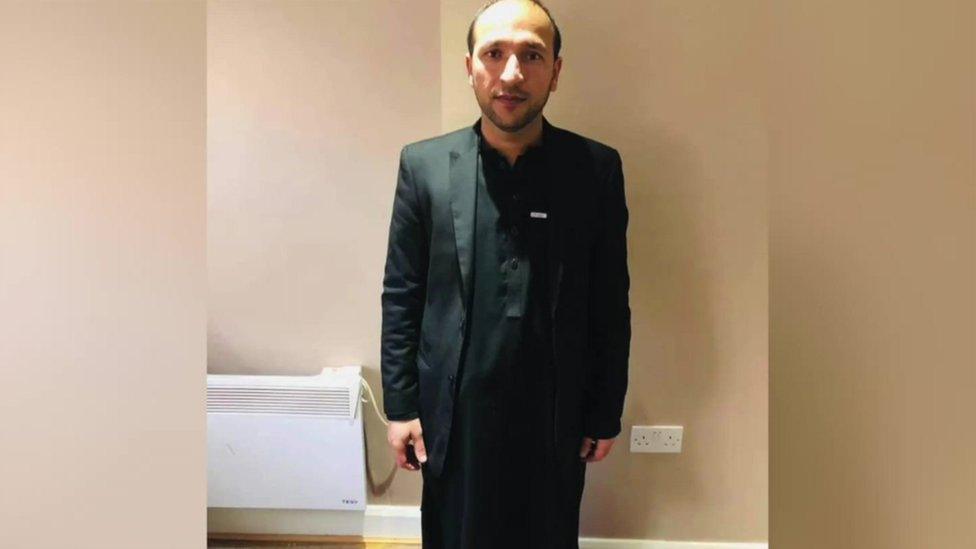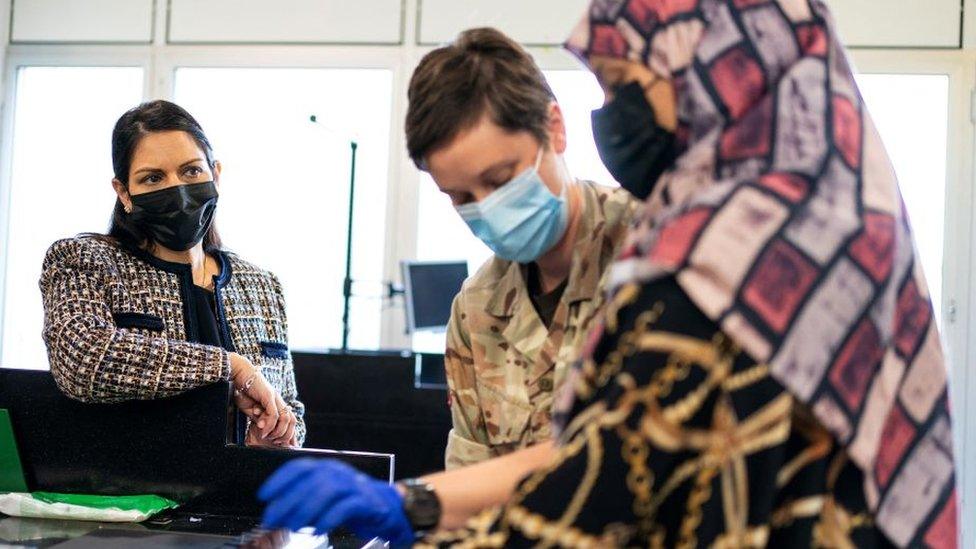Afghanistan: Final UK flight for civilians leaves Kabul, says government
- Published
Chief of the Defence Staff Gen Sir Nick Carter: "It's absolutely heartbreaking that we can't bring everybody out''
The UK's final evacuation flight purely for civilians has left Afghanistan's capital, Kabul, the Ministry of Defence has said.
Further flights which leave will have UK diplomatic and military personnel on board, it added.
The head of the armed forces, Gen Sir Nick Carter, said it was "heartbreaking" they had not been able to rescue everybody.
More than 15,000 people have been evacuated by the UK since 14 August.
The Ministry of Defence said this number included more than 2,100 children.
Sir Nick said hundreds of Afghans eligible to come to the UK remained in Afghanistan.
Meanwhile, Defence Secretary Ben Wallace addressed returning troops, saying "the UK should be very proud of what you have done".
"Every one of you [has] displayed the highest levels of professionalism and bravery. You have helped thousands to get to a better future and safety. Thank you," he tweeted, external.
A mass airlift has been under way since the Taliban took control of the capital, with a deadline of 31 August in place for foreign troops to leave the country.
The US has been running the airport in Afghanistan's capital, where a suicide bomb attack on Thursday may have killed as many as 170 people - including two British nationals and the child of a British national.

A taxi driver from London, Mohammad Niazi, was among those killed during Thursday's attack
Among those killed in the attack was Mohammad Niazi - a taxi driver from Hampshire - who had travelled to Afghanistan to help his family get inside the airport.
It has not been confirmed whether he was one of the UK nationals referred to by the Foreign Office.
His brother Abdul Hamid said Mr Niazi been killed during the firing in the aftermath of the blast. He said his wife and two of his children were still missing.
More than 1,000 UK troops were in Kabul helping to process departures at the airport at the height of the operation. Some have already left and the rest will depart over the weekend.
The British ambassador to Afghanistan, Sir Laurie Bristow, said it was "time to close this phase of the operation now". He added: "But we haven't forgotten the people who still need to leave. We'll continue to do everything we can to help them."
Allow X content?
This article contains content provided by X. We ask for your permission before anything is loaded, as they may be using cookies and other technologies. You may want to read X’s cookie policy, external and privacy policy, external before accepting. To view this content choose ‘accept and continue’.

Chief of the defence staff Sir Nick told Radio 4's Today programme: "[The evacuation] has gone as well as it could do in the circumstances... but we haven't been able to bring everybody out and that has been heartbreaking, and there have been some very challenging judgements that have had to be made on the ground."
He said the number of Afghans who were eligible to come to the UK but remained in Afghanistan was in the "high hundreds".
He suggested some would not have wanted to take the risk of travelling to the airport - or been unable to - rather than it being down to "processing" issues.
But he added: "We are forever receiving messages and texts from our Afghan friends that are very distressing. So we're all living this in the most painful way."
He said those of them who hadn't been able to leave via evacuation flights but were able to get out another way would "always be welcome in Britain".
Those already evacuated include British nationals, as well as almost 8,000 Afghans eligible under the UK's relocation scheme for those who worked for the UK government and other vulnerable individuals.
As of Friday, the government said between 800 and 1,100 eligible Afghans and 100 to 150 Britons were yet to be evacuated.
Chairman of the foreign affairs select committee Tom Tugendhat, who served in the military in Afghanistan, told BBC Breakfast he was "extremely sad" so many of his friends had been left behind and he was continuing to work to get people out of the country.
However, he said people should "forget" about trying to get to Kabul airport, due to the numerous dangerous checkpoints that have been installed along the motorways.
"We're looking at different networks to get people into second countries, and then connecting them to high commissions and ambassadors of the United Kingdom, to get them to the UK safely," he said.
Getting the plane out of Afghanistan was "happiest moment of my life"

What happens to Afghan refugees coming to the UK?
Arrivals on official flights enter a 10-day Covid quarantine in a hotel
Government officials and local authorities are trying to find them permanent homes
A shortage of suitable accommodation means many will be placed in hotels
Some will get refugee status and can live in the UK permanently
Others will get a five-year visa to live and work in the UK - and can then apply for permanent residence
Afghans arriving independently will enter the normal system for asylum claims - which has a backlog of 70,000 people
These people cannot settle, or work, while their claims are considered
Related topics
- Published28 August 2021
